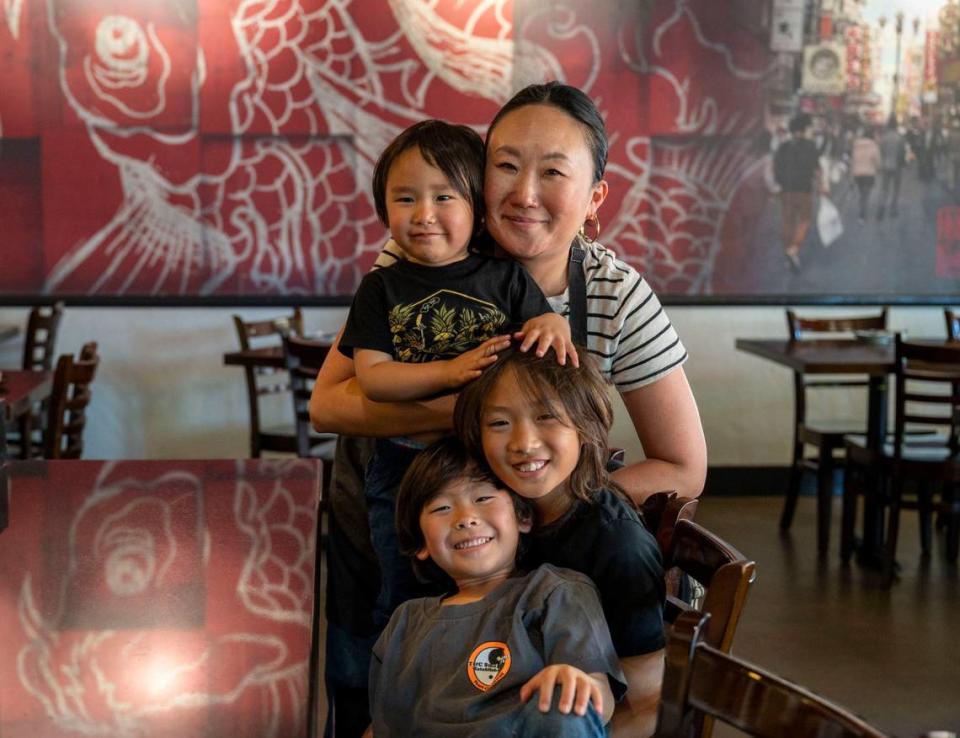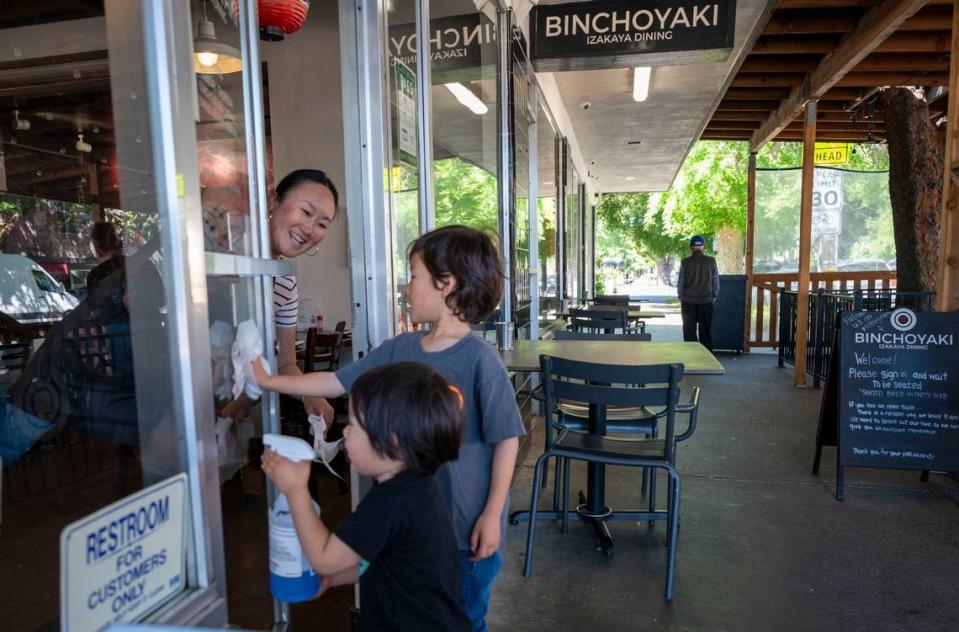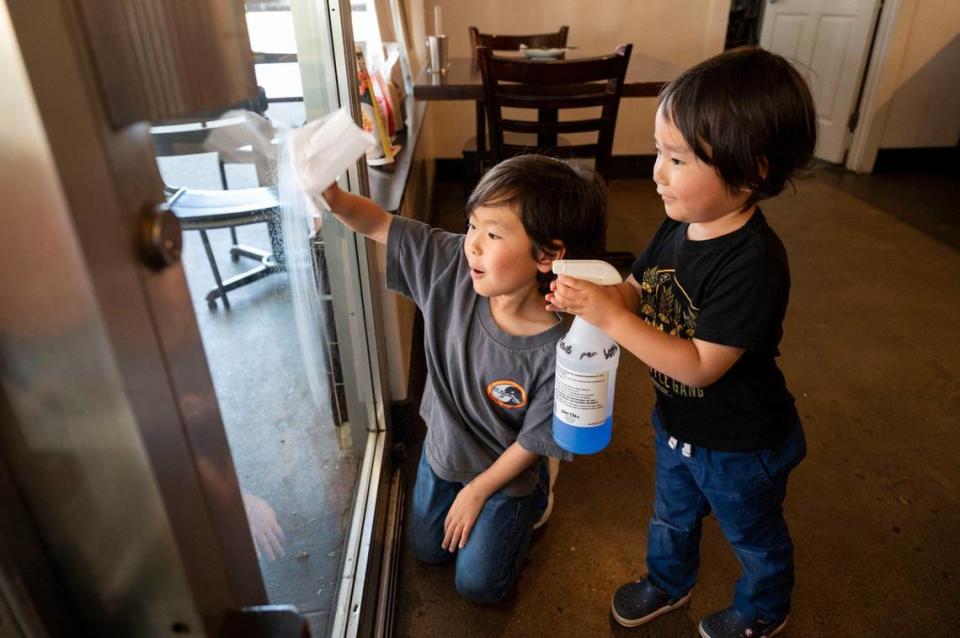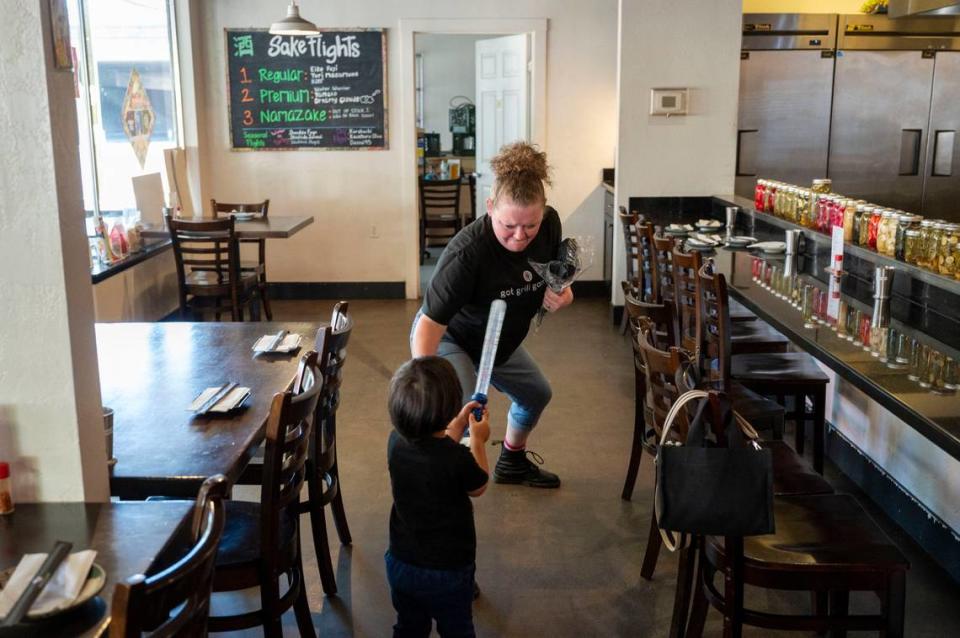Odd hours, busy days: What it’s like to be a working mom in Sacramento’s restaurant, bar scene
Danielle McMahon spent Mother’s Day 2019 working a shift at The Red Rabbit Kitchen & Bar.
She felt fine about working on a day that honored motherhood, or at least as fine as she felt about working Sundays in general. But a fellow server wanted to make the day special for McMahon and the other moms. She brought in pins with pictures of their children, including McMahon’s daughter Hadley.
“She was like, ‘maybe people will tip us more with our kids’ faces on us,’” McMahon said.
Customers didn’t react the way McMahon’s colleague had hoped, but no matter.
“Didn’t really make a difference, but it was still cute,” McMahon said. They were a nice gesture, along with the flowers and Champagne given to staff moms after the brunch shift.
Now a bartender at midtown wine bar Ro Sham Beaux, McMahon is part of a relatively small group of working mothers in Sacramento’s restaurant and bar scene. In a laborious industry that necessitates odd hours, largely eschews paid parental leave and is still male-dominated at its upper ranks, juggling service and motherhood can wear women out — or give them the tools for a happy family life.
Timing is everything
Long before Toki Sawada and Craig Takehara were parents to three boys (Kikuma, 9, Haruki, 5 and Yoshiki, 3), they were culinary academy classmates at Le Cordon Bleu in Pasadena.
The owners of Southside Park izakaya Binchoyaki and Kizuna Bento, a stand in East Sacramento ghost kitchen The Line, Sawada and Takehara were together for 13 years before having children, both working their way up through various restaurants. At times, that meant two jobs apiece and 60-80 workweeks.
When they started a family, Sawada’s career as a pastry and sous chef took a backseat. She still gets to flex her expertise at occasional events such as the 2019 Tower Bridge Dinner and pitches in at Binchoyaki when necessary, but mostly handles the restaurants’ business side in addition to being a “short-order cook for my family.”

“Once I turned into a mother and started my own business, I really had to learn how to put work into my children’s schedule rather than putting my children’s schedule into work,” Sawada said. “I’m a list person and a routine person, and if I can’t get those certain things done in a day, I feel like I’ve failed myself. But I also had to learn that Kiku’s 9-year-old (year) is never going to come back. So is my 5-year-old, and my 3-year-old.”
A recent Saturday saw Sawada arrive at the Oak Park Farmers Market at 8 a.m. to sell Kizuna Bento boxes. Takehara dropped the kids off with her at 10:30 on his way to oversee Binchoyaki’s lunch shift. The farmers market closed down at 1 p.m., at which point Sawada took Kikuma to his East Sacramento Little League game, then jetted over to Pocket Little League to watch Haruki play.
Takehara’s lunch service ended at 2:30, so he rushed over to Pocket for the second half of Haruki’s game. At that point, Sawada drove Yoshiki back to East Sacramento to catch Kikuma’s final innings. Once it was all done, Sawada drove those two boys back to Binchoyaki, where Takehara was waiting with Haruki before dinner service began.

“We literally have to talk to each other about this schedule multiple times because if we miss that window, everything will fall apart,” Sawada said.
McMahon, on the other hand, joined Ro Sham Beaux in part because of the time flexibility it offered, particularly compared to her last job managing the cosmetics store Lush in Westfield Galleria at Roseville. She and her husband leaned on family members to help watch Hadley, now 5, and their 2-year-old son Kieran during that time.
A return to bartending promised flexible hours, increased pay and — most importantly — no need for child care, McMahon said. She now spends most days watching her kids while her husband works as an electrician, coming home in time to relieve her before her 6 p.m. shift.
California bartenders made an annual average of $41,150 (which includes tips) as of May 2023, according to a Bureau of Labor Statistics report. Meanwhile, the average cost of sending a child to daycare was $13,408, per an Annie E. Casey Foundation study.
Some restaurants and bars also have more wiggle room to accommodate mothers than other companies, McMahon said. When she became pregnant with her daughter and needed less time on her feet, The Red Rabbit made her a manager, which gave her a role that allowed her to swap time on her feet for filing paperwork. Ro Sham Beaux staff, most of whom are younger than McMahon, understand that child-rearing — not laziness — cause her occasionally arrive late to work.
Do as I say, not as I’ve done
Diana Dich’s decision to work at her parents’ restaurant was, in a way, an act of rebellion.
Cindy Boc and Sinh Dich carved out long careers in Sacramento restaurants throughout their daughter’s childhood. Boc first took Diana to work at Jamie’s Broadway Grille in utero; 32 years later, she still makes sauces and salad dressings at the old-fashioned meat marvel.
Diana peeled crab for Jamie’s mixed grill entree as a kid, and returned to do kitchen prep while enrolled in American River College’s culinary arts program, mostly to spend time with her mom. When the family went out to eat on weekends, Boc quizzed her children: what tastes right or wrong? Where did the cook misstep? Is the chicken burned, or is it the sauce?
Boc and Dich are ethnically Chinese and immigrated in the 1970s from Vietnam where they lived as refugees. They supported their kids’ culinary interests — Diana’s brother even worked alongside their mom at Jamie’s for a decade.
The only exception, Boc repeatedly told Diana, was that she should never work in a Chinese restaurant.
“She’s worked in so many places, and Chinese restaurants are, to her, the hardest. There’s just so much labor involved for very little profit,” Diana said. “There’s a lot of prep that goes into Chinese food, especially American Chinese food. People don’t realize every single vegetable they’re eating is, like, hours of chopping by hand.”
Then Boc and Dich bought Happy Takeout, a no-frills Cantonese restaurant in Oak Park, in 2017 while holding onto their other jobs. The business was in trouble, according to Diana, and her parent’s couldn’t boost the mere 40 tickets or so per day for $6.45 chow mein or $7.75 sweet-and-sour pork.
“None of my siblings could do it, and if my parents can’t do it, that was very stressful,” Diana said. “It gave me a lot of anxiety thinking that they’re just sinking everything into this space, this business that’s not flourishing, that’s not doing great. So I just wanted to be there to try and run it for them, and hope that I could make it work.”
Diana was pursuing an art career at the time. She went against her mom’s advice and took the reins at Happy Takeout. After an adjustment period that includes conflicts with staff members hired under the old ownership, the restaurant now pulls in about 130 tickets per day.
Sawada’s kids, too, might one day have careers in the restaurant industry.
While Takehara cooks at Binchoyaki on Fridays and Saturdays, Sawada serves dinner on plastic dishware at home. After the meal, she retreats to the couch and lets her kids figure out how to clean up. Yoshiki usually totes dishes from the table to the sink, Haruki scrubs them clean and Kikuma disposes of food waste while delegating responsibilities to his brothers.

All three boys can all make scrambled eggs, even 3-year-old Yoshiki, and don’t seem to mind accompanying their parents for long hours at Binchoyaki or Kizuna. They pick up life lessons that’ll be beneficial whatever their future jobs are, Sawada said.
“The best part is that you get to bring your kids to work any time, no choice or choice,” Sawada said. “They get to see you work, they get to see what the real world is like. And at the same time, it’s almost like personal and work mixed together in a good way.”
Not for everyone
Gerine Williams left the restaurant industry due to its demands. It took a sweet gig to lure her back in, but she wasn’t there to stay.
Williams’ son Lucas was 3 years old when she began working her first restaurant job in Mulvaney’s B&L’s catering division. She quickly realized she wanted to spend more time with him, and wanted a more steady schedule for herself.
“Working in restaurants is hard. Everybody knows it’s hard. But with having kids, especially young kids ... I realized I was missing a lot of time with him, and I just wanted a little bit more stability,” Williams said.
Williams left Mulvaney’s to cook in a senior living home until 2014, when her second son Sam essentially made her a stay-at-home mom outside of the odd catering gig for family or friends. She began volunteering with the Oak Park Farmers Market after moving to the neighborhood, then came aboard to work on the market first through the AmeriCorps Vista program, then as a paid staff member.
A fellow volunteer introduced Williams to Jess Milbourn, the owner of renegade West Sacramento ice cream brand Devil May Care. When Milbourn opened a downtown Sacramento scoop shop in 2021, he tapped Williams as the store’s manager of operations.
If the idea of your mom running an ice shop sounds amazing, the reality lives up to the hype, Williams said. Lucas, now 17, had a line of friends eager for an after-school job at Devil May Care. Sam, now 10, was a picky eater at the time, but Williams always made sure to have something on the menu he’d love.
When Devil May Care closed its downtown location in 2022, though, Williams wasn’t interested in returning to the restaurant world. She relished the freedom she had at Devil May Care, where each staff member created a signature ice cream for their birthday, and didn’t want to go back to sweating in a typical kitchen.
“I really wanted to continue being part of this world. Like, this is my home. But I just couldn’t go back to that full on-the-line type of schedule,” Williams said.
She instead became the nonprofit Food Literacy Center’s community engagement manager, largely to revive the Oak Park Farmers Market after it collapsed during the COVID-19 pandemic. It’s a more stable job than working in a restaurant, she said, and seeing children warm up to vegetables through nonprofit programming never gets old.
“It’s really exciting to see kids get really interested and excited about food and what they’re eating and how it all comes together,” Williams said. “To me, those are the little — we call them ‘mission moments,’ where I really get to explore the things that I care about.”
Future plans
Diana Dich followed in her parents’ culinary footsteps, but doesn’t plan to be a working mom herself. She saw Boc work long hours at Jamie’s Broadway Grille, cut hair as a cosmetologist on weekends and somehow cook breakfast and dinner for her own family every day. Now an adult herself, the stress seems like more than she wants to bear, she said.
Kids weren’t in Dich’s future plans before she began working at Happy Takeout, and her decision has only solidified over the past few years, she said. The serious time commitment, odd hours and emotional demands of running a restaurant leave little room in her eyes for raising a family, she said.
“I’ve never intended on having kids, but it definitely reinforces (that) for me,” Dich said. “I can’t imagine having a kid because I (wouldn’t be able to) even focus on the kid, because I (would be) focused on the restaurant.”
McMahon enjoys bartending for now, but isn’t sure she’ll stay in the industry as her kids get older. She’s considered taking an office job with more regular hours once they’re in school in order to spend more time with them after class.
“Honestly, I still don’t know what I want to do when I grow up,” McMahon said. “That’s why I love having the service industry to fall back on. It just feels so second nature to me, and it doesn’t consume me in the sense that I have a really good separation of home and work.”

That distinction can be trickier for owner-operators such as Sawada and Takehara. They’ve considered hiring additional staffers so that they can spend spend more time with their children — Takehara ideally wants to coach his sons’ teams, not stop by to spectate when he can. But the economy is too fragile to do so, Sawada said.
There are also parts of them that don’t want to step away from the restaurants they built.
“As much as we do want to be with our kids, Binchoyaki and Kizuna are our babies too,” Sawada said. “Not being there as much, I feel like we’re not giving our babies enough attention. And it’s a hard balance because our passion is really (that) we love to cook. Learning how to balance with kids and our passion, sometimes (they) collide.”


